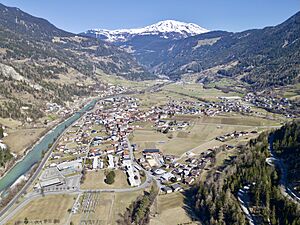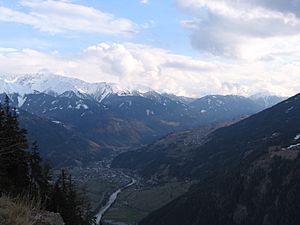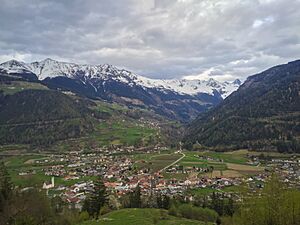Prutz facts for kids
Quick facts for kids
Prutz
|
||
|---|---|---|

View of Prutz towards north
|
||
|
||
| Country | Austria | |
| State | Tyrol | |
| District | Landeck | |
| Area | ||
| • Total | 9.74 km2 (3.76 sq mi) | |
| Elevation | 864 m (2,835 ft) | |
| Time zone | UTC+1 (CET) | |
| • Summer (DST) | UTC+2 (CEST) | |
| Postal code |
6522
|
|
| Area code | 05472 | |
| Vehicle registration | LA | |
| Website | www.prutz.tirol.gv.at | |
Prutz is a small town, also called a municipality, in the Landeck area of Austria. It's located in the beautiful state of Tyrol. Prutz sits where the Kauner valley meets the Inn River.
It is about 10 kilometers (6 miles) south of the city of Landeck. The borders to Italy and Switzerland are not too far away!
Contents
History of Prutz
Prutz has a long history, dating back to ancient times. It was once a resting spot on the Via Claudia Augusta. This was an important Roman road. Later, it became a post station for mail delivery.
The town was first mentioned in official records between 1027 and 1034. At that time, it was called Bruttes. The main church in Prutz was built in the Late Gothic style. It was later updated in the Baroque style during the 1600s.
In 1903, a big fire destroyed most of the village. However, the center of Prutz still shows its old design. Houses were built close together, which is typical for West Tyrol.
Geography and Nature
Prutz is located where two rivers meet: the Inn and the Faggenbach. This makes it a scenic spot.
Natural Surroundings
To the east of Prutz, you'll find the Kaunergrat recreation area. This is also a beautiful nature park. It's a great place to explore the outdoors.
To the west of the village, there's a popular skiing area. It's called Serfaus-Fiss-Ladis.
Cycling Route
Prutz is also on the Via Claudia Augusta cycling route. This route follows the path of the old Roman road. It's a fun way to see the area by bike.
Climate in Prutz
The weather in Prutz changes with the seasons. Summers are generally warm, and winters are cold.
| Climate data for Prutz (1971–2000) | |||||||||||||
|---|---|---|---|---|---|---|---|---|---|---|---|---|---|
| Month | Jan | Feb | Mar | Apr | May | Jun | Jul | Aug | Sep | Oct | Nov | Dec | Year |
| Record high °C (°F) | 13.5 (56.3) |
18.0 (64.4) |
22.4 (72.3) |
25.0 (77.0) |
30.5 (86.9) |
33.4 (92.1) |
35.5 (95.9) |
33.6 (92.5) |
29.3 (84.7) |
25.3 (77.5) |
20.0 (68.0) |
15.2 (59.4) |
35.5 (95.9) |
| Mean daily maximum °C (°F) | 2.2 (36.0) |
4.9 (40.8) |
9.9 (49.8) |
13.4 (56.1) |
18.6 (65.5) |
21.5 (70.7) |
23.8 (74.8) |
23.4 (74.1) |
20.0 (68.0) |
14.7 (58.5) |
7.0 (44.6) |
2.8 (37.0) |
13.5 (56.3) |
| Daily mean °C (°F) | −2.9 (26.8) |
−1.2 (29.8) |
3.0 (37.4) |
6.6 (43.9) |
11.4 (52.5) |
14.3 (57.7) |
16.2 (61.2) |
15.7 (60.3) |
12.2 (54.0) |
7.3 (45.1) |
1.5 (34.7) |
−2.0 (28.4) |
6.8 (44.2) |
| Mean daily minimum °C (°F) | −6.3 (20.7) |
−5.1 (22.8) |
−1.4 (29.5) |
1.8 (35.2) |
5.9 (42.6) |
8.8 (47.8) |
10.7 (51.3) |
10.5 (50.9) |
7.3 (45.1) |
3.0 (37.4) |
−1.8 (28.8) |
−5.1 (22.8) |
2.4 (36.3) |
| Record low °C (°F) | −22.0 (−7.6) |
−18.8 (−1.8) |
−17.6 (0.3) |
−8.0 (17.6) |
−5.9 (21.4) |
0.6 (33.1) |
3.2 (37.8) |
1.0 (33.8) |
−4.4 (24.1) |
−7.8 (18.0) |
−17.5 (0.5) |
−19.2 (−2.6) |
−22.0 (−7.6) |
| Average precipitation mm (inches) | 31.9 (1.26) |
30.2 (1.19) |
31.3 (1.23) |
26.1 (1.03) |
53.6 (2.11) |
86.2 (3.39) |
98.6 (3.88) |
99.2 (3.91) |
61.4 (2.42) |
40.1 (1.58) |
39.7 (1.56) |
35.3 (1.39) |
633.6 (24.94) |
| Average snowfall cm (inches) | 17.8 (7.0) |
19.2 (7.6) |
6.4 (2.5) |
1.2 (0.5) |
0.2 (0.1) |
0.0 (0.0) |
0.0 (0.0) |
0.0 (0.0) |
0.0 (0.0) |
0.0 (0.0) |
5.0 (2.0) |
15.8 (6.2) |
65.6 (25.8) |
| Average precipitation days (≥ 1.0 mm) | 5.4 | 4.5 | 5.0 | 5.2 | 9.5 | 11.1 | 12.0 | 11.9 | 8.5 | 6.4 | 6.4 | 6.2 | 92.1 |
| Average relative humidity (%) (at 14:00) | 62.9 | 53.4 | 43.5 | 43.1 | 44.2 | 45.9 | 46.7 | 48.7 | 48.0 | 50.7 | 59.5 | 67.3 | 51.2 |
| Mean monthly sunshine hours | 71.6 | 92.1 | 121.9 | 134.1 | 170.2 | 166.3 | 192.7 | 173.0 | 141.2 | 119.9 | 79.5 | 64.7 | 1,527.2 |
| Percent possible sunshine | 47.5 | 55.6 | 55.2 | 51.9 | 52.6 | 50.1 | 57.0 | 60.1 | 61.7 | 60.2 | 51.4 | 46.4 | 54.1 |
| Source: Central Institute for Meteorology and Geodynamics | |||||||||||||
Population of Prutz
The number of people living in Prutz changed over time. In the late 1800s, the population went down. This was partly because some people moved to the Americas.
But since 1910, the population has been growing steadily. As of 2013, about 12% of the people in Prutz were from other countries. Many of these people were from other European Union countries. Others came from Turkey or countries that used to be part of Yugoslavia.
| Historical population | ||
|---|---|---|
| Year | Pop. | ±% |
| 1869 | 589 | — |
| 1880 | 559 | −5.1% |
| 1900 | 506 | −9.5% |
| 1910 | 473 | −6.5% |
| 1923 | 553 | +16.9% |
| 1934 | 591 | +6.9% |
| 1961 | 853 | +44.3% |
| 1971 | 1,206 | +41.4% |
| 1981 | 1,320 | +9.5% |
| 1991 | 1,444 | +9.4% |
| 2001 | 1,670 | +15.7% |
| 2011 | 1,741 | +4.3% |
| 2016 | 1,777 | +2.1% |
Economy and Jobs
Prutz is home to one of Austria's largest hydroelectric power plants. This plant uses water to create electricity. It is run by a company called Tiroler Wasserkraft.
The power plant gets its water from the Gepatsch Reservoir. This reservoir was built in 1964. The plant produces a lot of electricity each year.
Local Businesses
Many towns nearby are big tourist spots. Prutz, however, has many small businesses. These businesses serve the people living in the surrounding area.
One of Austria's biggest sledge factories is located in Prutz. Sledges are like sleds used for snow. The village also has farms, including an apricot plantation. These apricots are used by a local distillery. Prutz even claims to have Austria's highest-located winery!
Culture and Things to See
Prutz has a lively culture with many local groups.
Community Activities
The local football (soccer) club, SV Prutz, hosts a music festival every year. This festival happens on Pentecost weekend. Famous artists from Austria often perform there.
Other active groups in the village include:
- An orchestra group
- The voluntary fire brigade
- A shooting club
- A distiller association
- A carnival group
Special Fountain
In 1212, a special fountain was discovered in Prutz. It's called the Saurbrunn Quelle today. The water from this fountain contains iron, calcium, magnesium, and sulfur. It is also naturally fizzy. People believe the water has healing properties. The village has built a resting place around the fountain. Anyone can get the water for free there.
Main Sights to Visit
Prutz has several interesting historical places to see:
- The parish church of the Ascension of the Virgin Mary. It includes a chapel, a graveyard, and the priest's house.
- The Kaltenbrunner Chapel, found at the south end of the village.
- The Lourdes Chapel and a Calvary (a sculpture showing Jesus on the cross) in Entbruck.
- The Tullen Chapel, located southwest of the old Inntal road.
- Wiesele, which used to be a hermitage. This is a quiet place where a religious person lived alone.
- Old Late Gothic houses in the center of the village. There are also two old towers outside the main area.
- The Pontlatz bridge, an iron bridge built in 1899.
Transportation
Getting to and from Prutz is quite easy.
Air and Train Travel
The closest airport is Innsbruck Airport. It is about 80 kilometers (50 miles) away from Prutz. The nearest train station is Landeck-Zams railway station. This station is about 20 kilometers (12 miles) away. You can take a bus from the train station to Prutz.
Bus Services
There are regular bus services from Prutz to other towns. These include Kaunertal, Scuol, and Serfaus.
Famous People from Prutz
Some notable people have come from Prutz:
- Joseph Schwarzmann (1806–1890): He was a talented ornamental painter in Munich. He was also made an honorary citizen of Speyer.
- Johann Piger (1848–1932): He was a sculptor who worked in Salzburg.
See also
 In Spanish: Prutz para niños
In Spanish: Prutz para niños
 | Ernest Everett Just |
 | Mary Jackson |
 | Emmett Chappelle |
 | Marie Maynard Daly |





